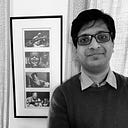T.N. Krishnan (1928–2020): violinist; confidante of ragas
On T.N. Krishnan’s passing this month, I felt the urge to write a long tribute. Instead, here is a slightly updated version of a post I wrote in 2008, when I had just heard him live for the second time in my life.
When at eighteen I left for Middlebury College in Vermont, I carried with me about a dozen cassette tapes of Indian classical music. One among these was a tape from my mother’s collection, of T.N. Krishnan’s concert in L.A. in the year of 1989. Of all the things that Amma had sent off with me with all her love, I came to cherish this one artifact more so than any other.
I had enthusiastically coded it C2, C for Carnatic (I had brought along some of father’s particular methods with me as well!). Many may find fault with the overtly crowd-pleasing playlist — Ninnukori varnam in Mohanam, Vathapi Bhajeham in Hamsadhwani, Endaro Mahanubhavulu in Sri, Ka Va Va in Varali, Krishna Ni Begane Baro, Janani Ninnuvina in Reethigowla, Jagadodharana in Kapi. For me, missing Doddah’s thaiyer vadai, Amma’s hug and Madras’s sodium vapour lamps, it was home. Many nights were meandered into dream world listening to T.N. Krishnan on a Walkman. I soon had weekly a show on Indian classical music on the college radio station (WRMC 91.1 FM, Middlebury), and in the four years that it was on air, I often returned to T.N.Krishnan when my playlist ran dry.
I have listened to T.N. Krishnan live twice. The first time was in New York some years ago, when he played with his sister N. Rajam. I was surprised. I had seen many sepia-tinted and black and white photographs of him accompanying others likes Semmangudi Srinivasa Iyer and other stalwarts of the mid-20th century. In those he looked obedient, subdued. In New York, he played brilliantly, fidgeted, smiled, smirked, waved his arms, let go of his bow, picked it up at the last possible instant. He was as a child with cotton candy — immersed and candid.
I went for a concert of his today in Delhi. He is eighty. He doesn’t move about as much. But he has the energy of a teenager on Red Bull, and his music is just as alive. He is technically brilliant, but unlike many others, he has the humility to allow the heart command the fingers rather than the head. In turn, his heart seems to be commanded exclusively by the raga — as it was, as it is, as it should be. He is as a confidante to the raga, deeply concerned for its welfare, gently conversing with it to understand how it would like to actualize itself in this world, in that moment. In his hands the raga inevitably seems to find a way to express itself with confidence and vulnerability. Krishnan’s music is replete with delicate turns of phrases that seem simple and easy to execute, and therefore seem deceptively obvious, but are in fact mind-bogglingly difficult to conceive. He also made extensive use of tonal modulation — unafraid to make the violin barely audible if it suited the conception of the phrase. It is for some of these reasons that when he plays, there is no distinction in the listener’s mind between a “minor” raga and a “major” raga. Each piece is in and of itself worthy of authentic expression and undivided attention.
[His love for ragas, and sharing his understanding of them was also evident when, after playing Sogasuga Mridanga Talamu in the raga Sriranjani, he spent a few minutes elaborate on a particular nuance of a particular phrase in the song. He showed how the beauty of the phrase and the raga was brought out from the subtle use of the Pa note, which technically does not belong to the scale of the raga. In retrospect, this was one of my earliest exposures to the conception of a raga beyond its scale].
I will leave you with two pieces. One in the raga Surutti / Surati. This is one of my favourite ragas. And Krishnan’s handling of the raga is legendary. The second is another Thyagaraja composition, Najivadhara in the raga Bilahari. I do not like the raga at all. I find it too unidimensional in a “happy-because-I-don’t-know-any-better” kind of way. It is supposedly upbeat, but with little depth. The only rendition in the raga I have come to love, from the moment I heard it, is this one by Krishnan. That is the power of Krishnan’s bow, and mind.
